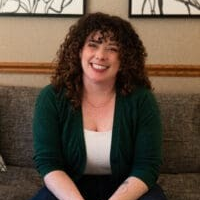In graduate school, nobody tells you that becoming a therapist means signing up for the unknown. Will any of my clients miss their appointments today? How much money will I make this month? Will my carefully planned intervention help this couple? Psychotherapy is filled with uncertainty, and there’s little guidance on handling it. Over the years, I’ve watched myself, my colleagues, and my supervisees try to navigate this uncertainty, and I’ve learned that if we want to keep doing this work, it’s imperative we develop a healthy relationship with uncertainty. Otherwise, burnout isn’t just a possibility, it’s inevitable.
I confronted my own relationship with uncertainty when it started getting in the way of my clinical work and my mental health. It made me wonder how uncertainty had become so intolerable to me and what I could do about it.
Ever since I can remember, my relationship with uncertainty felt fraught, likely the result of growing up with a chronically ill father and an emotionally unpredictable mother. What kind of mood will mom be in today? I’d wonder as a child. Is dad going to die? The uncertainty was so unbearable that over the years, I developed a defense strategy: be prepared. I studied as much as I could and planned for all possible outcomes. Even when I became a therapist, I held on to the illusion that preparation would keep me one step ahead of a potentially bad outcome.
In Letters to a Young Therapist, Mary Pipher wrote, “the answer to most questions is, ‘It depends,’” I interpreted this to mean the more you knew, the more options you had, so I read clinical books, attended trainings, listened to therapy podcasts, and consulted like my life depended on it. But I never feel truly secure in my work or in my life outside work. It felt like uncertainty was lurking around every corner.
One day, while looking for answers, I came across the obituary of therapy icon Carl Whitaker, which mentioned one of his favorite phrases: “Stay confused.” It was a lightbulb moment. Instead of running from uncertainty, I wondered, what if I embraced it? But how?
To start, I sought the expertise of therapists who’d trained under family therapy legends and whose work spoke to me. Pauline Boss had trained under Carl Whitaker, and I was fortunate to meet her briefly during my doctorate program. I also came across the work of Jean McLendon, who’d trained under Virginia Satir. I emailed both women and told them I was on a quest to change my relationship with uncertainty. Both agreed to meet with me to discuss it.
Valuing Confusion
Pauline Boss is exactly the kind of woman I hope to be when I’m older. At 90, she’s still writing, and still helps therapy students and mid-career professionals alike. She perfectly fits my image of a therapist, with a soft, calming voice, and equal parts direct and compassionate. When we finally met via Zoom, I was jittery with excitement. When I asked her about her experience with the ambiguity inherent to the field she smiled.
“I’m the child of Swiss immigrants,” she said, “and Switzerland is very good at precision work. When I went to college, I attended a seminar where we were asked to use one word to describe ourselves. I picked the word decisive—and I was proud of it. But that decisiveness was knocked out of me when I met Carl Whitaker! He valued confusion, and if it didn’t arise naturally, he’d do something to make it arise.”
The very idea of embracing confusion and uncertainty made my stomach tighten. I still desperately wanted to cling to that sense of decisiveness that Pauline once had once been so proud of. How do I let go of it? Pauline’s answer sounded surprisingly simple: companionship.
“It’s the medicine that heals,” she said. “Whitaker always said, ‘We are temporary. Our job is to connect clients with someone who will be in their life after therapy is done.’ I once worked with a woman who was living alone while her husband was deployed overseas. She had no family nearby, so she’d bring her dog to our sessions. I’m not really a dog person, but I could see that he was her companion. And in the end, she told me her dog saved her from suicide. It wasn’t me who saved her. We therapists just walk alongside people for a little bit.”
I thought back to earlier in my career, when I loved hearing clients say how helpful I was. But as I spent more time doing therapy, I noticed that clients’ big breakthroughs and insights came from small moments I hadn’t put much stock in. Pauline was right: we weren’t infallible experts with all the answers. We didn’t need to be. We were simply companions on our clients’ healing journeys.
Calamine Lotion for the Unknown
A few weeks later, I sat down for my meeting with Jean McLendon, a therapist and teacher who worked directly with Virginia Satir and continues to teach her approach. Jean shared the profound impact Satir had on her—and how she’d spent most of her first training feeling like she didn’t measure up to her colleagues. But a serendipitous conversation during that training led to a lightbulb moment that convinced her she needed to be okay with confusion. And she’d built on this insight, she told me, realizing that feeling confused meant she was learning something new, beyond her current understanding.
As I listened to Jean, I felt heartened, encouraged to move toward ambiguity as a path to insight. After all, insight isn’t something we’re born with; we have to allow ourselves to be open to it.
“I began calling my struggles ‘experiencing cognitive chaos,’” Jean said with a laugh. “And I taught myself to stay in the present. That is what I can know—the right now. I can’t know 10 minutes from now, or change 10 minutes ago. This mindfulness and knowing give me the resources I need to manage change. I can breathe, and I can appreciate that I’m alive right now. I have value, and I have tools. This is the calamine lotion for the unknown.”
What an apt metaphor, I thought. There is something itchy and uncomfortable about the unknown. It makes us squirm. Scratching that itch by seeking certainty might provide some immediate relief, but it’s not a long-term solution.
“We’re not meant to face the unknown alone,” Jean continued, “because we’re relational.”
***
Meeting with Pauline and Jean was a breath of fresh air. It felt like a weight had been lifted off my shoulders that I hadn’t even known was there. Today, I try to imagine their voices when I feel stuck—in and outside of therapy. I tell myself, I have value, I have tools, and it’s not my job to figure this out alone.
These conversations reminded me that oftentimes, the so-called problem isn’t actually the problem; it’s our tendency to struggle against it that creates the real problem. Uncertainty wasn’t the reason I’d been struggling; I’d been struggling because of how I’d been responding to it. I’d been trying to plan my work and life without acknowledging that some problems can’t be foreseen, and not all answers can be formulated in advance. I began to realize that there had been times when this thinking had caused me to try to fix my clients’ pain, rather than simply sitting with them in it.
Now I am building a more peaceful coexistence with uncertainty. I don’t know the value my clients may find in sitting in the unknown, but I’m getting more comfortable sitting in that uncertainty with them—instead of colluding with their desires to control and problem-solve. I’ve learned that a great therapy session isn’t necessarily determined by what we accomplish, but more often by how the session feels. The best sessions are the ones where we reach a flow state and both of us are fully present.
For a long time, my anxious parts told me that being a great therapist was a matter of knowing enough. But today, I know that being a great therapist really comes from letting go, trusting the process, believing in my skills and value, and being truly present with my clients.
I’m still fine-tuning my relationship with uncertainty. In fact, I’m sure I’ll be working on this for the rest of my life. But when my anxious parts seek certainty, I take a breath and remind myself that I can handle whatever comes next.
Aimee Hubbard
Aimee Hubbard, PhD, LMFT, is a couples therapist, supervisor, and researcher based in the Kansas City metro area. Her clinical and academic work explore the messiness of seeking help, relational growth, therapist development, and the courage it takes to stay grounded in uncertainty. She’s currently working on her first book, “Stay Confused,” about navigating the uncertainty inherent in clinical practice.













